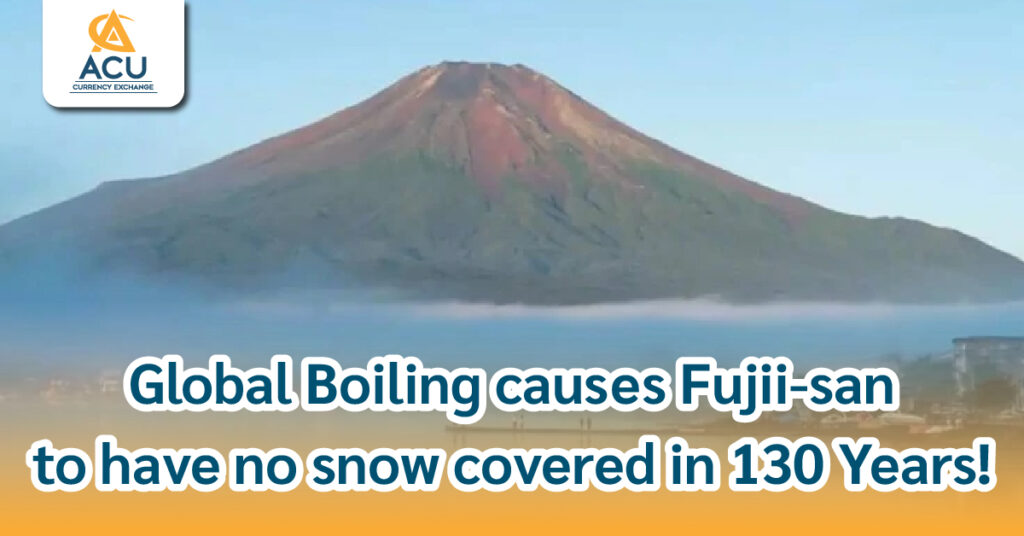Global Boiling causes Fujii-san to have no snow covered in 130 Years!

Mount Fuji, one of Japan’s most important and beautiful symbols, is facing an unprecedented phenomenon: its peak has not been covered by snow since early November, this is the longest snow wait in 130 years since records began in 1894. The ACU Currency Exchange will discuss this situation, which clearly reflects climate change that impacts nature.
Content
An abnormally high temperature
According to AFP this year, Mount Fuji, which usually snows from early October, remained clear and snowless in early November. Unusual warmth prevented snow from falling as it should have been, especially in the past year when it started snowing on October 5, after the hottest summer in history. The temperature this summer was above average at 1.76 degrees Celsius, resulting in the delayed formation of snow.
Jet Stream and Aerial Phenomena
The study found that the jet stream, a high-speed airflow around the world, plays an important role in Japan’s climate, especially in winter, when warm south winds play a role in bringing in hot air, preventing snow from falling because the temperature is not low enough to turn rain into snow as it should be.
The impact of climate change
Yutaka Katsuta, a weather forecaster at the local Meteorological Agency, said although the situation could not be immediately identified as a result of climate change, it was a sign that was consistent with scientists’ expectations that climate change could significantly affect the season and temperature.
The Meaning of No Snow
The absence of snow from Mount Fuji is not only a new record but also a reminder of the potential impact on the ecosystem and volcanic activities such as tourism and mountaineering, which this year saw fewer climbers, resulting from a limit in the number of visitors to deal with excessive tourism.
Mt. Fuji is more than a symbol of Japan, as it represents a global natural change. The fact that Mt. Fuji is snowless this winter indicates changes that could have adverse effects on the environment and society. In the face of climate change, scientists and researchers will have to work together to find solutions and prepare for an uncertain future so that this symbol of beauty will continue to exist in the future.
Those interested in exchanging good-rated foreign currencies in Huai Kwang can come to exchange money easily with the ACU Currency Exchange. Simply visit Huai Khwang MRT Exit 4 and walk 500 meters straight to ACU Building Headquarters.
Exchange rates can be checked by
business day and time at https://acu-exchange.com/
or online booked at Line OA: https://lin.ee/ph4iznU
Open Every Monday – Friday from 10:00 a.m. to 5:00 p.m.
Address: 205/18 – 19 Ratchadaphisek Road, Ratchadaphisek Subdistrict, Din Daeng District, Bangkok 10400.
Tel: 02-0021008, 061-0283918, 084-3244893
About the Author

ACU-Exchange
We are committed to providing the best foreign currency exchange experience and customer satisfaction to meet the needs of Thais who want to travel abroad and foreigners who come to continue their studies or work in Thailand.



